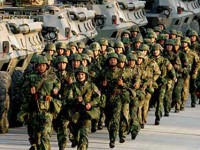Zhou Bo, Senior Fellow, Center for International Security and Strategy, Tsinghua University
Sep 14, 2015
While the legislation is used as a policy tool by the US and occasionally even China, its strategy has been overtaken by events. The act is out of date, impractical and prevents bilateral relations from developing on an even footing with more mutual trust.
Sun Chenghao, Fellow, Center for International Security and Strategy of Tsinghua University; Munich Young Leader 2025
Sep 09, 2015
Although US willingness to engage China in the international system seems to be diminishing, the Chinese president’s upcoming state visit is an opportunity to get a new type of major-country relationship back on track. This will accumulate more positive energy if both countries seek functional cooperation in deferent spheres by practical and systematic means.
Ma Jun, Research Fellow, PLA Academy of Military Science
Sep 02, 2015
China’s parade to commemorate the 70th anniversary of victory in the War of Resistance Against Japanese Aggression does not reflect a desire to show off its military might. The event’s aim is to demonstrate China’s confidence and determination to maintain the victorious achievements and the peace for the world.
Qin Xiaoying, Research Scholar, China Foundation For Int'l and Strategic Studies
Aug 27, 2015
Indecisive western responses to China’s military parade invitation are based ultimately on their profound worries about the potential impacts that China’s development will exert on the political and economic patterns of the present-day world.
Wu Zurong, Research Fellow, China Foundation for Int'l Studies
Aug 21, 2015
The peaceful desires of most Japanese people and the powerful trends of economic globalization and world multi-polarization do not in any way support the strengthening of the US-Japan military alliance. In fact, they are harbingers of its disintegration.
Chen Jimin, Guest Researcher, Center for Peace and Development Studies, China Association for International Friendly Contact
Jul 30, 2015
The new Pentagon strategy is a throw-back to Cold War thinking and contrary to the world view of America’s founding fathers. It may pose a new barrier to developing new major-power relations in a multi-polar world, unless all sides seek a cooperative approach.
Joan Johnson-Freese, Professor, US Naval War College
Jul 21, 2015
Given the accepted narrative of the space environment as congested, contested and competitive, the U.S. has been told to deter, defend and defeat Chinese challenges in space. This rhetoric wrongfully assumes challenge and elides preemption with prevention.

Chen Xiangyang, Director and Research Professor, CICIR
Jul 16, 2015
A changing world requires China to take a clearer, more comprehensive approach to its national security. It strikes a balance between maintaining national security and promoting socioeconomic development, between internal and external security, between the security of territory and people, between traditional security and non-traditional security, and between security of a single country and that of all countries.
Richard Weitz, Senior Fellow, Hudson Institute
Jul 15, 2015
The latest U.S. National Military Strategy has provoked a strong but misguided reaction in Beijing. U.S. policy makers are not forecasting an inevitable a war with China and identify areas where the two countries’ national security interests overlap sufficiently for bilateral collaboration.
Shen Dingli, Professor, Institute of International Studies, Fudan University
Jul 02, 2015
Despite its serious concern about information security, the US displayed more impressive diplomatic courtesy than in previous sessions, helping the two sides to build trust, reduce suspicion, and restore collaboration. That contributes to a constructive atmosphere for the upcoming summit meeting of the two countries’ leaders.
Back to Top

- China-US Focus builds trust and understanding between the U.S. and China through open dialogue among thought leaders.
- Our Offerings
- Topics
- Videos
- Podcasts
- Columnists
- Research Reports
- Focus Digest
- Stay Connected
-
Thanks for signing up!
- Get the latest stories from China-US Focus weekly.